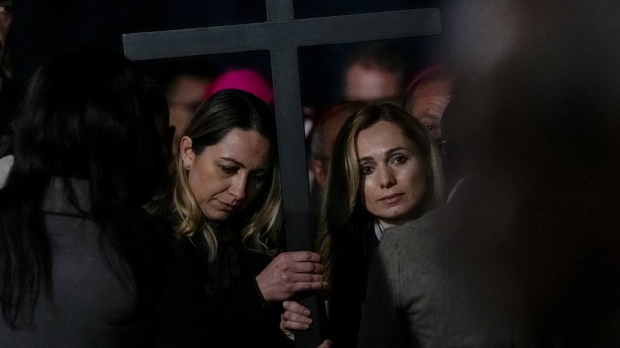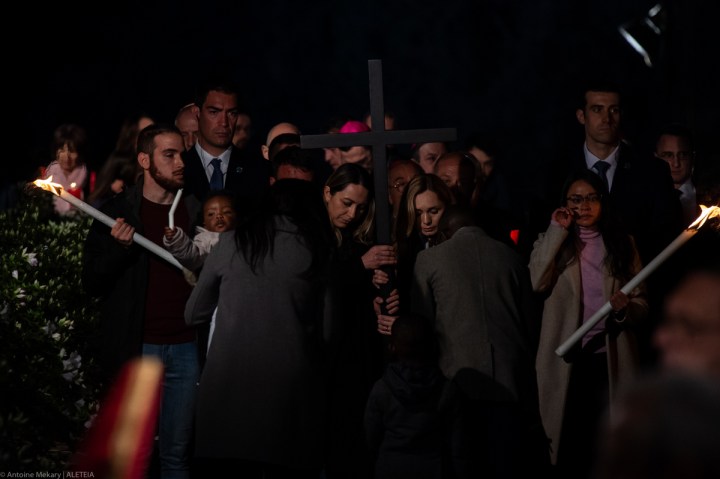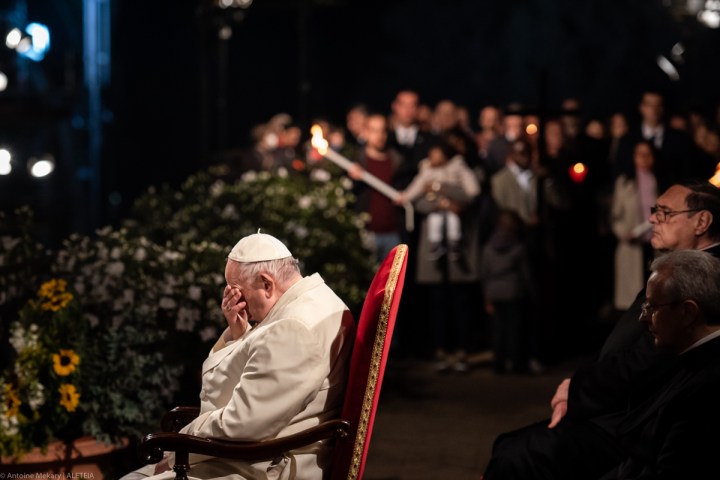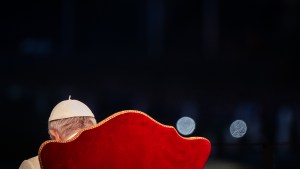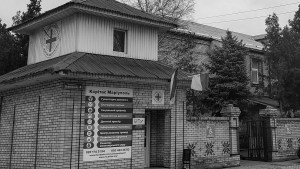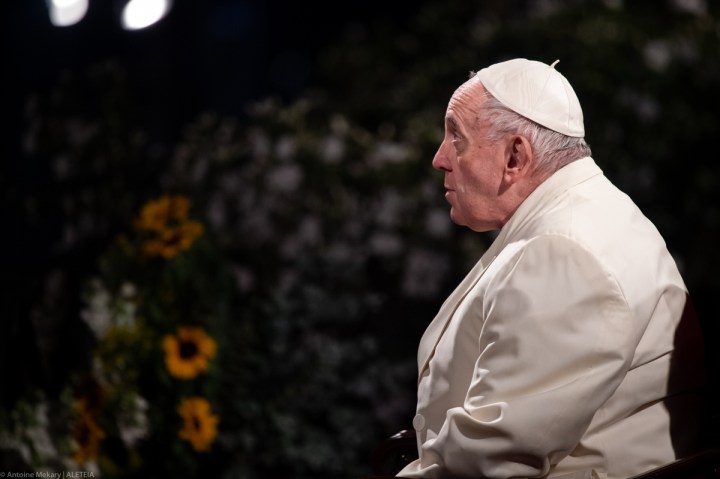Albina is Russian, and Irina is Ukrainian. The two young women carried the cross together during the Stations of the Cross on Good Friday at the Colosseum in Rome, April 15, 2022, representing families who say “no” to war.
The gesture of peace chosen by Pope Francis symbolizes the Passion. Just last week, he published a book against war, calling for the courage to build peace. He also has pointed out that wars are decided by a few powerful people, while it is the general population who suffer and shed their tears and blood.
Albina is Russian and a third-year nursing student at the Campus Bio-medico University in Rome. Irina, a Ukrainian, is a nurse at the “Together for the cure” Center for Palliative Care of the University Polyclinic Foundation of Opus Dei.
The two women, who carried the cross together during the 13th Station of the Cross presided over by Pope Francis on Good Friday evening, have been friends for years. In fact, their friendship was solidified during the long and difficult months of the COVID-19 pandemic.
Albina told Rai News that when the war came, she was worried that it might affect their friendship. However, Irina understood that Albina was neither in favor of nor responsible for the war, and their friendship has continued and even strengthened.
In their interview with RAI, they say that despite the war, their feelings of mutual appreciation haven’t changed. They appreciate each other as people, as women, and as professionals in the service of saving lives, and they share “the suffering of the two peoples.”
The war, Irina says, “has brought us closer together. Because the suffering of the two peoples is something that brings us closer and isn’t something we wanted.” Albina asks for a solution and to work for peace. “No one deserves to live under bombs, and children should not wake up in an anti-aircraft bunker.”
Pope’s decision criticized
The Pope’s initiative to bring together representatives of these two nationalities in this way was met with mixed reactions. Ukrainian Greek Catholic Archbishop Sviatoslav Shevchuck and the new Ukrainian Ambassador to the Holy See, Andrii Yurash, were among those who expressed their reservations.
The Pope’s representative in Ukraine, Archbishop Visvaldas Kulbokas, responded to Ukrainian criticisms of the Pope’s decision, explaining that it should be seen “as a moment of prayer under the cross,” given that the Passion of Christ unites and does not divide; under Jesus’ cross, there were his executioners along with indifferent and righteous people alike.
Archbishop Kulbokas, as the apostolic nuncio, is one of the few diplomats who has never left Kiev: “I understand the Ukrainians who tell me that at this moment it is difficult to accept any other sign than that of compassion,” the Lithuanian prelate said.
As for the Way of the Cross, “the cross of Jesus has the vocation to reconcile us all with God in the first place, and this is necessary at all times, even now. However,” said Archbishop Kulbokas, “if anyone wanted to interpret this gesture as a sign of reconciliation between Russians and Ukrainians, it would be too soon. This will be possible when the war is over, not now, with the ongoing aggression and open wounds. In this sense, the sign may be valid for the future, when it will be necessary to rebuild forgiveness after the war, which we hope will come soon.”
A compromise in respect
In the end, there was a solution that showed both the unitive power of the Cross and the Holy See’s desire to show it’s sensitivity to the suffering of the Ukrainian people. Instead of reading the meditation for the 13th station, the guide invited everyone to pray in silence, affirming that often, silence is more powerful than words.
Irina and Albina stood tall in this moment of silence, holding together to the wood of the Cross, and communicating with their own solemn silence, as well as their times looking at each other, their own hopes for the end of the war dividing their peoples.
The polemic
The weapons of the Gospel—stressed the Pope during the general audience on Holy Wednesday—are “forgiveness and gratuitous love of neighbor, of every neighbor.” These words of the Bishop of Rome transcend the controversy that had been sparked last Tuesday by the Ukrainian ambassador to the Holy See, Andrii Yurash. He said in a tweet that he did not want two families, one Russian and one Ukrainian, to carry the cross together during the Stations of the Cross at the Colosseum.
And later, Yurash proposed that the Holy See replace Albina with a woman from Poland, a nation that has received millions of displaced Ukrainians during the Russian aggression on Ukraine.
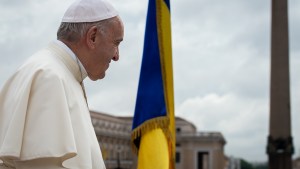
The Pope is a pastor, not a politician
For his part, Civiltá Cattolica’s director Antonio Spadaro, S.J., on Wednesday defended the Vatican’s decision and applauded the testimony of Irina and Albina.
“You have to understand one thing,” Spadaro said in an interview with RAI in reference to Ambassador Yurash’s words. Pope Francis “is a pastor, not a politician.”
Spadaro said that the image of the two women carrying the cross together may cause scandal “because they represent something that cannot be obtained” right now: “peace.”
Subsequently, he wrote on social networks, Francis “acts according to the evangelical spirit, which is that of reconciliation even against all visible hope during this war of aggression that he has defined as ‘sacrilegious.’” For this reason, Pope Francis also consecrated Ukraine and Russia together to the Immaculate Heart of Mary.
In the end, when Albina and Irina carried the Cross together during the 13th Station on Good Friday, they didn’t say a word. They were under the Cross. Scandalously together. It was a prophetic sign as darkness dominates. And it is an invocation to God to give us the grace of reconciliation.
